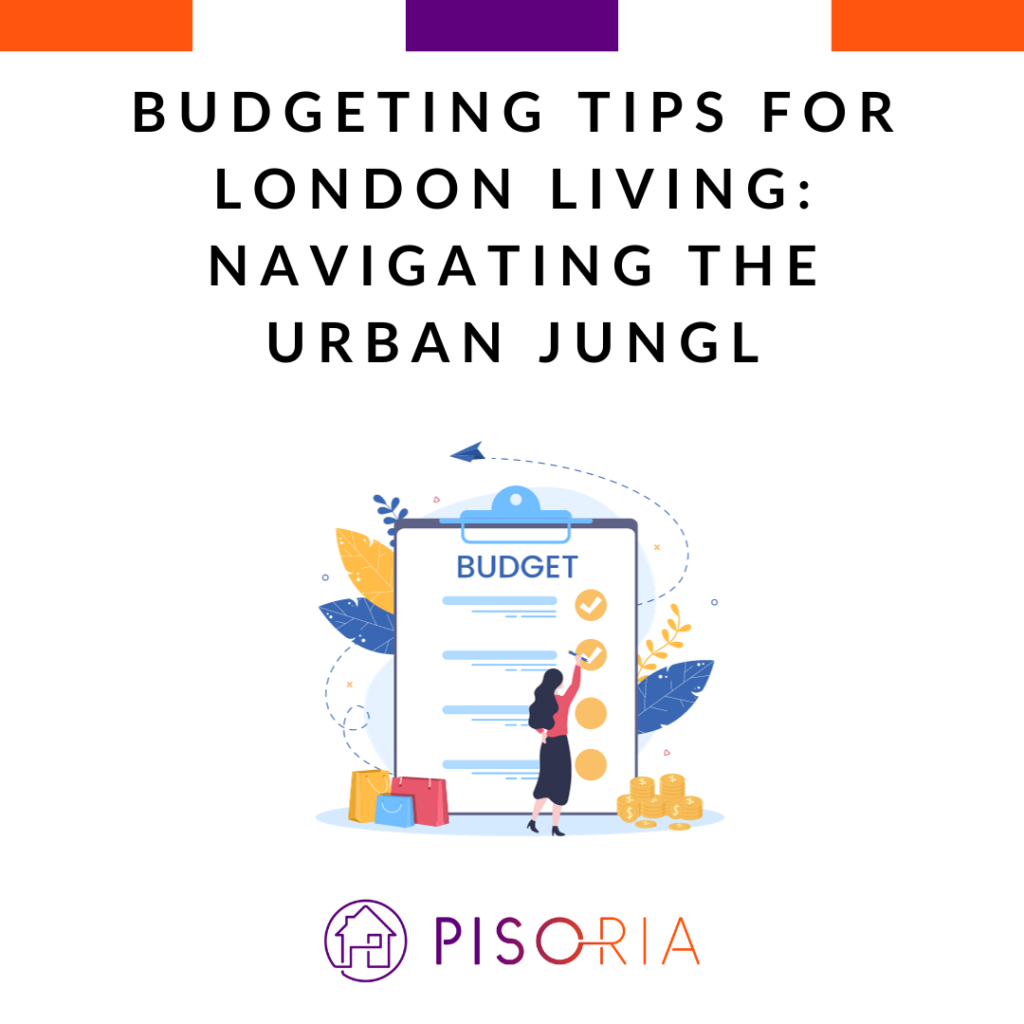Budgeting Tips for London Living: Navigating the Urban Jungle

Introduction
Embarking on the journey of living in London is an exciting prospect, yet the city’s notorious living costs can pose a significant challenge. Navigating the vibrant streets of this metropolis requires not just enthusiasm but a strategic approach to budgeting. In this comprehensive guide, we will delve into practical and actionable tips tailored for potential tenants looking to make the most of their London adventure without breaking the bank.
Chapter 1: Understanding London’s Living Costs
Budgeting: Living in the heart of London involves more than just finding a place to call home. It’s an immersion into a dynamic ecosystem of expenses. Understanding the major contributors to living costs is the first step towards effective budgeting.
The Breakdown
Rent: London’s diverse neighborhoods come with varying rental prices. The central areas often demand a premium, while the outskirts may offer more affordable options. By understanding the rental landscape, potential tenants can make informed decisions aligning with their budgetary constraints.
Utilities: Beyond rent, utility costs can significantly impact monthly expenditures. This includes electricity, gas, water, and internet services. We’ll explore practical tips for minimizing these costs while ensuring a comfortable living environment.
Transportation: London’s extensive public transportation system is both a blessing and a potential expense. Navigating the Tube, buses, and other services can be cost-effective if approached strategically. We’ll provide insights into travel passes, alternative transportation options, and the impact of location on commuting costs.
Groceries: Eating well in London doesn’t have to be a financial burden. Local markets, discount options, and savvy grocery shopping techniques can contribute to significant savings. We’ll uncover the secrets to maintaining a healthy diet without overspending.
Comparisons and Insights
Comparing these living costs to national averages will offer valuable insights. Certain neighborhoods may have a higher rent but lower transportation costs, while others may provide more affordable groceries but higher utility expenses. By understanding these nuances, potential tenants can tailor their living choices to align with their budget priorities.

Chapter 2: Navigating Rental Costs
Finding an affordable rental in London is a significant aspect of effective budgeting. With a dynamic rental market, potential tenants need to be strategic in their approach.
Strategies for Affordable Rentals
Diverse Neighborhoods: Explore neighborhoods with varying rental prices. While central locations may be pricier, the outskirts or up-and-coming areas could offer more affordable options.
Property Features: Understand how specific features impact rental costs. Balconies, larger living spaces, and proximity to public transport can influence prices. Prioritize features based on your budget and lifestyle.
Navigating the Dynamic Market
London’s rental market is dynamic, and being informed is key. Stay updated on market trends, be flexible with move-in dates, and consider negotiating rent, especially in times of market fluctuations.
Chapter 3: Smart Transportation Choices
London’s public transportation system is extensive, providing various options for commuting. Making smart choices can significantly impact your monthly budget.
Cost-Effective Commuting
Oyster Card: Invest in an Oyster card for discounted travel on buses, trams, the Tube, London Overground, and the Docklands Light Railway (DLR).
Cycling and Walking: Consider cycling or walking for shorter distances. London is a pedestrian-friendly city, and cycling can be both cost-effective and healthy.
Strategic Living Choices
Choosing a residence with proximity to public transportation hubs can minimize daily commuting costs. Additionally, evaluate whether a travel pass or pay-as-you-go system aligns better with your commuting patterns.
Chapter 4: Grocery Shopping Hacks
Maintaining a balanced diet while adhering to a budget is possible through savvy grocery shopping.
Budget-Friendly Grocery Shopping
Local Markets: Explore local markets for fresh produce and affordable options. Borough Market, for instance, offers a diverse range of products.
Discount Options: Utilize supermarket discount sections and consider purchasing non-perishable items in bulk to save money in the long run.
Meal Planning Tips
Plan meals in advance, create shopping lists, and avoid impulse purchases. This not only ensures a well-balanced diet but also prevents unnecessary spending.
Chapter 5: Entertainment on a Budget
London’s cultural richness offers numerous entertainment options without depleting your budget.
Free and Affordable Cultural Experiences
Museums and Galleries: Many museums and galleries offer free entry or discounted rates during specific times.
Parks and Outdoor Activities: London’s parks provide a serene escape. Engage in outdoor activities that are not only enjoyable but also budget-friendly.
Budget-Friendly Socializing
Discover local pubs and bars with happy hour deals. Additionally, explore community events and free activities that align with your interests.
Chapter 6: Maximizing Utility Savings
Understanding and minimizing utility expenses contribute to effective budgeting.
Cost-Effective Utilities
Comparing Providers: Compare utility providers to find cost-effective options for electricity, gas, water, and internet services.
Energy-Saving Practices: Implement energy-saving practices such as turning off lights and appliances when not in use.
Understanding Council Tax
Understand how council tax is calculated, as it varies by property and location. Explore exemptions or discounts available to certain individuals.
Chapter 7: Building a Financial Cushion
Living in a high-cost city necessitates financial planning for the unexpected.
Importance of Emergency Funds
Unforeseen Expenses: London life may present unexpected expenses. An emergency fund provides a financial cushion to handle unforeseen circumstances.
Setting Financial Goals: Define short-term and long-term financial goals. This could include saving for travel, further education, or a property investment.
Balancing Saving and Enjoying Life
Effective budgeting isn’t solely about cutting costs. It’s about striking a balance between saving for the future and enjoying the present. Find joy in budget-friendly activities and experiences.
Chapter 8: Taking Advantage of Local Discounts
London offers numerous discounts for residents, providing opportunities to save on various expenses.
Exploring Local Discounts
Loyalty Programs: Join loyalty programs offered by supermarkets, cafes, and other establishments.
Student Discounts: If eligible, take advantage of student discounts on a wide range of products and services.
Local Promotions: Stay informed about local promotions and discounts through online platforms or community bulletin boards.
Tips for Maximizing Discounts
Regularly check for updated discounts, utilize apps that aggregate discounts, and explore community events that may offer special promotions.
Chapter 9: Staying Financially Fit in London
Summarizing key takeaways to ensure financial health in the dynamic city of London.
Strategies Recap
Prioritize Spending: Identify essential expenses and prioritize spending based on your values and lifestyle.
Continuous Evaluation: Regularly evaluate your budget to ensure it aligns with your financial goals and living situation.
Adapting to London’s Dynamic Landscape
Financial fitness involves adapting to London’s dynamic landscape. Embrace changes in your lifestyle, explore new budgeting strategies, and remain open to optimizing your financial plan as needed.
Chapter 10: Conclusion
In conclusion, effective budgeting for London living is a continuous and adaptive process. By understanding and implementing the strategies outlined in this guide, potential tenants can embark on their London adventure with financial confidence.
Additional resources:
Budgeting as a student in London
We also offer rooms with ALL the bills included and we have one left

